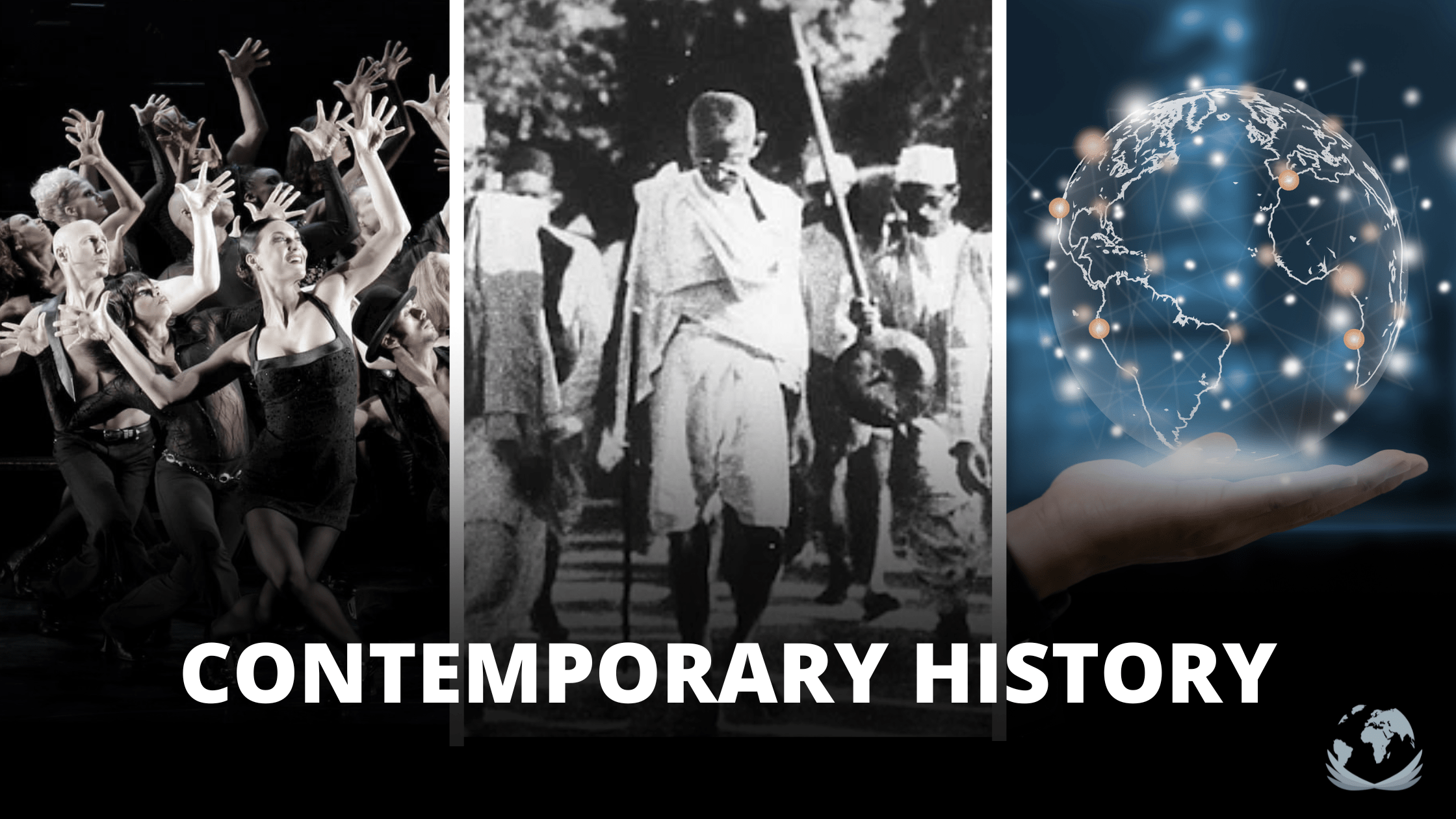Contemporary History in 3 Words: Jazz, Gandhi, Technology
I have often thought that leaders who want to go to war should themselves be put in a boxing match with the other leader so that they can duke it out to decide the outcome of the conflict rather than dragging thousands of unwitting and unwilling soldiers and civilians to their deaths or dismemberment. Sadly, that is not how we do things. The leaders usually stay in comfort and power while the average folks go off to fight wars they don’t want to fight and the civilians are often left to fend for themselves. And this has been a major theme in history of our contemporary world. Wars drag ordinary citizens through hell while rulers remain safely, comfortably, at home.
Life on the ground, even in a war zone, these last 100 years, this writer argues, has been shaped dramatically by all of the aforementioned world changing events. But, life, ordinary life that goes on in some way as the world goes crazy around us has been charged by sound, music, a mood of this era - jazz, the foundational root for the music and much of the culture of the last 100 years. Jazz liberated us from strict forms of music and culture and offered respite from and a tone to day to day life. Jazz is syncopation, improvisation, and atonal experimentation and a break from the past, a step into the future. Jazz and its morphing into the blues, rock and roll, punk, hip hop, techno, changes the rhythms of life, the way we move, dance, talk and dress. Jazz like all art is not just fluffy extraneous stuff. It is life, it is how we see and experience life. Think of the way we imagine Jesus as a blond, white man as depicted by Italian Renaissance painters. In all likelihood, Jesus was dark skinned with dark curly hair. Our views of Jesus were established 800 years ago and are not likely to change. This is the power of art. It shapes our view of the world and how we interact with it.
Life on the ground has been changed by people who have given voice to ordinary people. Gandhi whose efforts to empower the poor and voiceless gave rise to no less than the British abandonment of India as well as the breakup of India and Pakistan. More spectacularly, Gandhi showed others a way for the poor and disenfranchised to challenge power and inspired others to lead efforts to fight for human rights. Martin Luther King, Jr, Nelson Mandela, Cesar Chavez, Desmond Tutu, Malala Yousafzi, Gloria Steinam, all followed in Gandhi’s footsteps, opening the door for changes in the ways that human beings’ lives can have equal value and hopes for their future. Gandhi’s grand and peaceful efforts to ennoble the poor and voiceless broke the world’s awareness of the possibilities of what people might achieve and how life might be better for the disenfranchised.
Life on the ground, has experienced its biggest change with the advent of the internet. The democratization of information is beyond dramatic. To know that nearly every human on the planet holds in their hand an implement with which they can access or share information, reach out across the world, learn about life beyond their scope, watch in real time as a war unfolds, upload the music they just wrote and have people around the world listen to it, watch the World Cup play out while they sit in their home in Botswana - all of this is a kind of change that is no less monumental that an earthquake, a meteor crashing into earth.
When life on the ground changes, the ripple effects can often be more powerful than war or politics. This is why our stories matter. All of our stories, here at History Chip, together are part of a movement to change history into the story of life on the ground. We want this to be a groundswell of voices of ordinary life. History Chip is here to be the change, the democratization of history, the place where all voices matter, Share your stories and be a part of the change.
Below is a bit of a story of life on the ground. You can read the rest of the story here
1968 and Me
~ A story by Bob Grady
The year 1968 saw many horrendous events take place. Martin Luther King, Jr. and Bobby Kennedy were assassinated. The TV showed the killing of a man by a Vietnamese Officer with a gunshot to the head of a bound prisoner. 70,000 North Vietnamese troops took part in the Tet offensive which took the battle from the jungles to the cities. The USS Pueblo was captured by the North Koreans and the crew was held captive for eleven months. Eugene McCarthy won a primary in New Hampshire but Hubert Humphrey gets the nomination to run against Richard Nixon. The Democratic Convention in Chicago led to more riots and police reaction which turned violent. The death of Martin Luther King led to major clashes all over America by Blacks righteously angered by his killing. Student sit-ins were beginning. Most were protesting the war in Vietnam and the draft, but civil rights were part of the turmoil. The sixties were definitely a time of change. The innocence of America had come to a turning point.
We welcome your stories of how you are experiencing life on the ground. Your voice and your stories matter.

